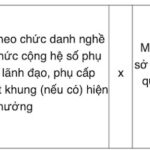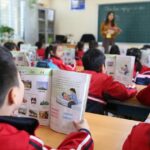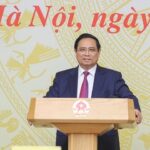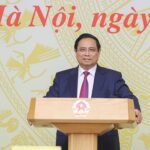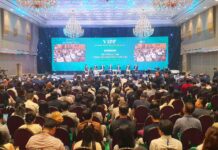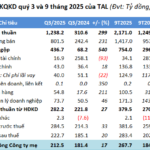On the eve of the new school year’s opening ceremony for 2025-2026, Minister of Education and Training Nguyen Kim Son shared with the press about the opportunities, challenges, and tasks that the education sector will undertake and resolve in the coming time.
– Dear Minister Nguyen Kim Son, the education sector is awaiting a special event this year, the Opening Ceremony of the 2025-2026 school year, along with the celebration of the 80th anniversary of the establishment of the National Ministry of Education (now the Ministry of Education and Training). Could you please share with us the significance of this event?
The opening ceremony of the 2025-2026 school year takes place in a special context: the whole country is celebrating the 80th anniversary of National Day; implementing the historical “rearrangement of the country” process; and organizing Party Congresses at all levels. For the education sector, the new school year also marks the 80th anniversary of the tradition of the education sector and the establishment of the National Ministry of Education.
This is not only an opportunity for us to look back on the 80-year journey of education in developing the country but also a chance to become more aware of the mission and responsibility of education in shaping individuals and building and developing the country, striving to integrate in the new era.
The significance of the opening ceremony is even more profound when 52,000 educational institutions nationwide are connected online in combination with live television, with the presence of the highest-ranking leaders of the Party and State, to spread faith, spirit, and determination to bring Vietnamese education to new heights.
– In the past time, the Party and State have had many preferential policies for education, especially Resolution 71-NQ/TW on breakthrough development in education and training. Could you please share with us about the opportunities and challenges of the education sector in the new school year?
This school year, the education sector is facing unprecedented opportunities. Never before has education and training received so much attention and expectation from the Party and State as it does today. Most importantly, the Politburo has just issued Resolution 71-NQ/TW on breakthrough development in education and training. This is an important political foundation to further promote the fundamental and comprehensive innovation of education and training established by Resolution 29-NQ/TW (in 2013) and continued to be emphasized in Conclusion No. 91-KL/TW (in 2024).
Along with this, a national target program on education and training development is being built; four important laws on education (Law on Teachers, Law on Education, Law on Higher Education, and Law on Vocational Education amended) have been and are expected to be promulgated this year, which will create a solid foundation for operating a modern, synchronous, and effective education system. The digital transformation, application of artificial intelligence, and STEM education are also opening up opportunities for education to enter a phase of enhancing quality and comprehensive innovation.
Along with the opportunities, the education sector also faces many challenges. The operation of the two-level local government model, especially at the commune level, poses high requirements for managing changes in organization, personnel, and apparatus.
Issues of educational equity; extra classes; teacher recruitment and transfer; and substantive universalization are also challenges that the sector must resolutely address. In addition, absorbing the very large investment resources in the coming time and ensuring efficiency and compliance will also require great efforts and endeavors.
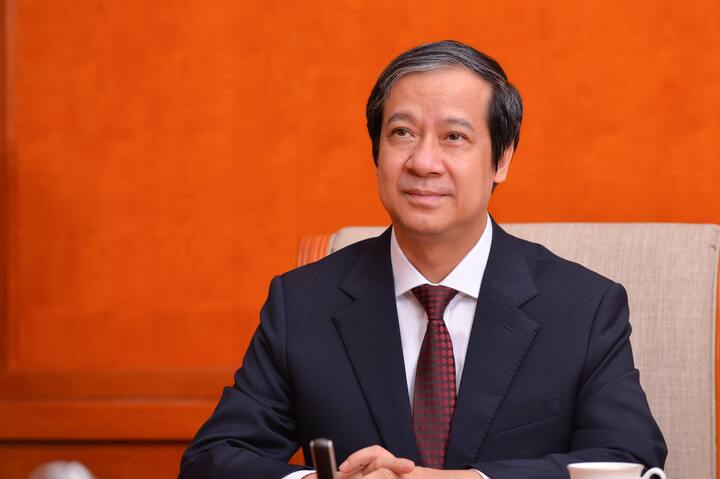
Minister of Education and Training Nguyen Kim Son
– To ensure educational activities in the context of the two-level local government, what solutions has the Ministry of Education and Training implemented, Mr. Minister?
To ensure that educational activities are not disrupted in the context of the two-level local government, the Ministry of Education and Training has implemented synchronous solutions.
In terms of institutional perfection, the Ministry has built and promulgated two Decrees and six Circulars stipulating the decentralization, devolution, and determination of state management authority in the field of education.
In terms of professional guidance, the Ministry has issued official documents on non-administrative boundary enrollment; organizing two sessions/day; implementing the 2026-2027 school year tasks; and deploying programs and textbooks in the context of changing administrative boundaries.
The Ministry also organized seminars, established hotlines, and received information to remove difficulties and obstacles for localities.
Regarding the improvement of team capacity, the Ministry has developed documents, organized training courses, and published handbooks to support educational managers at the communal level and Departments of Education and Training to access information fully, systematically, concisely, and easily. In addition, the Ministry also organized six inspection teams in 15 provinces on this issue.
In the future, the Ministry of Education and Training will continue to review legal documents; strengthen professional guidance; improve the industry data system to ensure interconnectivity and synchronization; and continue to accompany and support localities in implementing the assigned tasks.
– The 2025-2026 school year is also the first year that the Law on Teachers is put into practice. So, what are the plans of the education sector, Mr. Minister?
Immediately after the Law on Teachers was passed by the National Assembly, the Ministry of Education and Training proactively built a system of guiding documents for its implementation. Regarding teacher recruitment, the Ministry is developing a Circular with the orientation of assigning the Departments of Education and Training to chair the implementation or advising the People’s Committees of the provincial level to decentralize and authorize suitably to the practical situation of each locality.
At the same time, the Ministry of Education and Training is developing a Decree guiding in detail a number of articles of the Law on Teachers, including regulations on the content and form of teacher recruitment. It is expected that the recruitment will include two rounds of examinations, compatible with the current regulations on the recruitment of public employees. However, the second round on professional knowledge and skills will be designed differently, closely following the actual process of teaching and education, ensuring the assessment of pedagogical capacity and professional skills of candidates at each educational level and training level.
The Ministry of Education and Training is also completing a draft regulation on salaries, allowances, and policies to attract and support teachers. It is expected that the basic salary of all teachers will increase, with an additional amount of at least VND 2 million, up to VND 5-7 million/person/month. This additional amount is only for the basic salary, excluding other allowances.
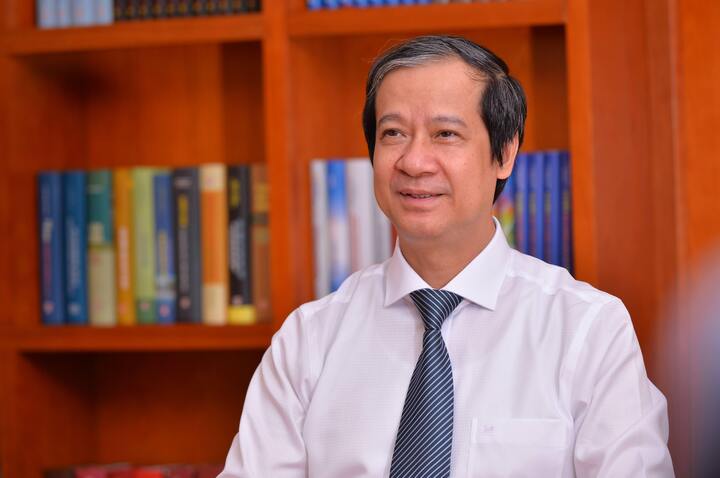
Minister Nguyen Kim Son
– To overcome the shortage of teachers in the new school year, what solutions has the Ministry of Education and Training deployed, Mr. Minister?
In the period of 2022-2026, the education sector was supplemented with 65,980 personnel by the Politburo. In the school years of 2022-2023 and 2023-2024, the whole country recruited more than 40,000 teachers. However, due to the continuous increase in the number of students and classes, the demand for teachers also increased sharply (in the school year 2023-2024, there was a shortage of 13,676 teachers; in the school year 2024-2025, there was a shortage of about 22,000 teachers).
Therefore, many localities are still lacking teachers. The main reason is the limited source of recruitment. In some subjects such as Informatics, Foreign Languages, and Arts, teacher training institutions face difficulties in enrolling students due to the low income of teachers. In addition, the process of allocating and recruiting cadres in many localities is still slow and prolonged.
Facing this situation, the Ministry of Education and Training has been and is implementing many solutions, such as: directing training institutions to open training codes and train teachers according to the actual needs of localities, especially for special subjects; requiring localities to recruit enough assigned personnel; directing localities to review and arrange the network of schools and classes; piloting the autonomy mechanism in some public preschool and general education institutions; and promoting socialization…
Along with the solutions from the central level, the Ministry proposes that localities proactively recruit enough assigned personnel, have policies to attract and support teachers, and arrange funds for contracting teachers according to regulations.
– What message would you like to send to teachers and students in the new school year of 2025-2026, Mr. Minister?
The school year 2025-2026 is a very important school year, with many important tasks to be implemented and many opportunities for innovation.
The keyword for this school year is “implementation”. It means focusing on effectively implementing the guidelines and policies of the Party, the laws of the State on education, as well as the 10 key tasks and solutions of the education sector for the school year 2025-2026. This is the way for the whole sector to inherit and promote the achievements gained in the past 80 years, overcome existing shortcomings and limitations, and open up new directions for Vietnamese education in the future.
Education is a century-long cause, requiring a long-term vision, perseverance, a sense of fairness, and the highest responsibility. I call on the whole sector, from managers to teachers, staff, and all students to prepare the best mindset, spirit, and conditions, and together unite and join forces to make the new school year a busy but joyful and successful one.
– Thank you, Mr. Minister!

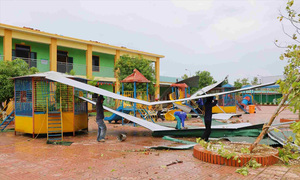
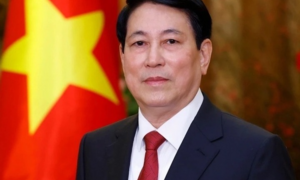

A United Front: The Political Resolution for a Standardized National Curriculum
“The Political Bureau directs a thorough review and evaluation of the implementation of the National General Education Program. This includes a unified approach to providing a single set of textbooks across the nation. The ambitious goal is to ensure free access to these textbooks for all students by the year 2030.”
The Great Teacher Shortage: PM Calls for Review to Address 100,000 Deficit
The Ministry of Home Affairs, in collaboration with the Ministry of Education and Training and local authorities, is conducting a comprehensive review of teacher recruitment processes for the period 2022-2026. This review aims to propose supplementary staffing allocations up to 2030, ensuring a robust and sustainable education system.


























